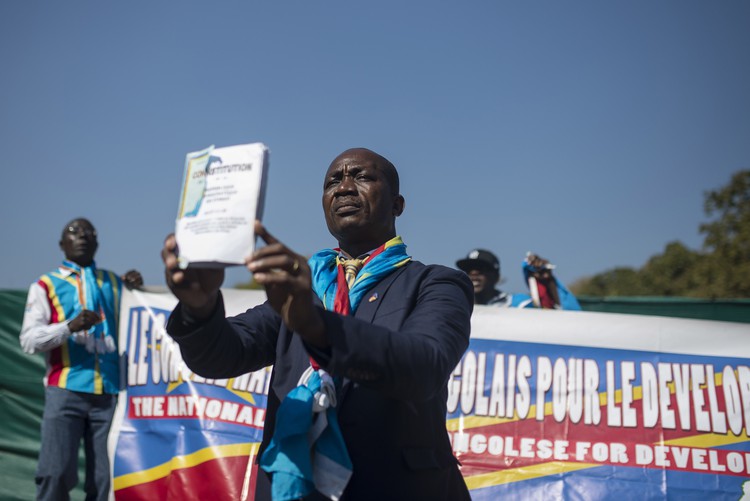DRC immigrants protest against Kabila visit
President Jacob Zuma hosted his Congolese counterpart in a bilateral meeting
A small but vocal group of Congolese immigrants protested outside the Sefako Makgatho presidential guesthouse in Pretoria, as President Jacob Zuma hosted the president of the Democratic Republic of Congo, Joseph Kabila. The two leaders were meeting with their respective ministerial teams as part of a binational commission.
Protesters, some of whom draped themselves in the light blue DRC flag were left disappointed when Kabila’s convoy avoided the protest and used another entrance into the presidential guesthouse. “The man is a coward. He heard there are some people protesting here and decided to avoid this entrance,” said one of the protesters who identified himself as Ountsche.
Earlier police tried to move the protesters away from the main gate but later settled on a compromise whereby demonstrators could stay if they remained peaceful and agreed not to block any cars. A large contingent of police manned the entrance to the compound and kept a watchful eye on the protesters who were energetic in their protest but never violent.
Taking turns at using a loudhailer, protesters expressed their dissatisfaction with Zuma’s government for hosting what they called an illegitimate president. “Kabila is an illegal president. There is no need for these meetings and for any deals to be signed. Kabila must fall because he has killed many African children,” yelled a protester over the loudhailer.
In December 2016, Kabila’s constitutionally mandated term of office ended but he has refused to leave his position and hold an election, sparking violence in some areas of the country. He claims that the voters’ roll is outdated and therefore elections had to be postponed. After the assassination of his father Laurent Kabila in 2001, Joseph Kabila assumed the leadership of the resource rich nation and has been the president ever since.
Jean Bwasa, a leader from the local Congolese community, held up a battered copy of the DRC’s constitution which the country drafted with the assistance of the South African government. He lamented the fact that Kabila had failed his responsibility to adhere to the DRC constitution’s mandate and vacate power. “I’m not sure why these leaders feel they need to hold on to power forever. When your time is up you should leave,” said Bwasa.
South Africa has a large community of migrants from the DRC, many of whom have fled after being threatened with violence after voicing their opposition to Kabila’s government.
Essie-Prince Mpinda representing the National Council of Congolese for Development said that there is little hope that Zuma’s government will pressure Kabila into vacating office and holding elections. However he still appealed to the South African government to exercise diplomatic channels to end the violence and human rights violations and to ensure free, fair and impartial elections as soon as possible. “The postponement of these elections has exacerbated political violence and instability and we condemn the welcome of Mr Joseph Kabila by the South African government,” Mpinda said.
Support independent journalism
Donate using Payfast

Don't miss out on the latest news
We respect your privacy, and promise we won't spam you.
Next: Thousands attend Eid prayers in Lenasia
Previous: Joe Slovo Park residents torch MyCiTi bus after shacks demolished
© 2017 GroundUp. 
This article is licensed under a Creative Commons Attribution-NoDerivatives 4.0 International License.
You may republish this article, so long as you credit the authors and GroundUp, and do not change the text. Please include a link back to the original article.

